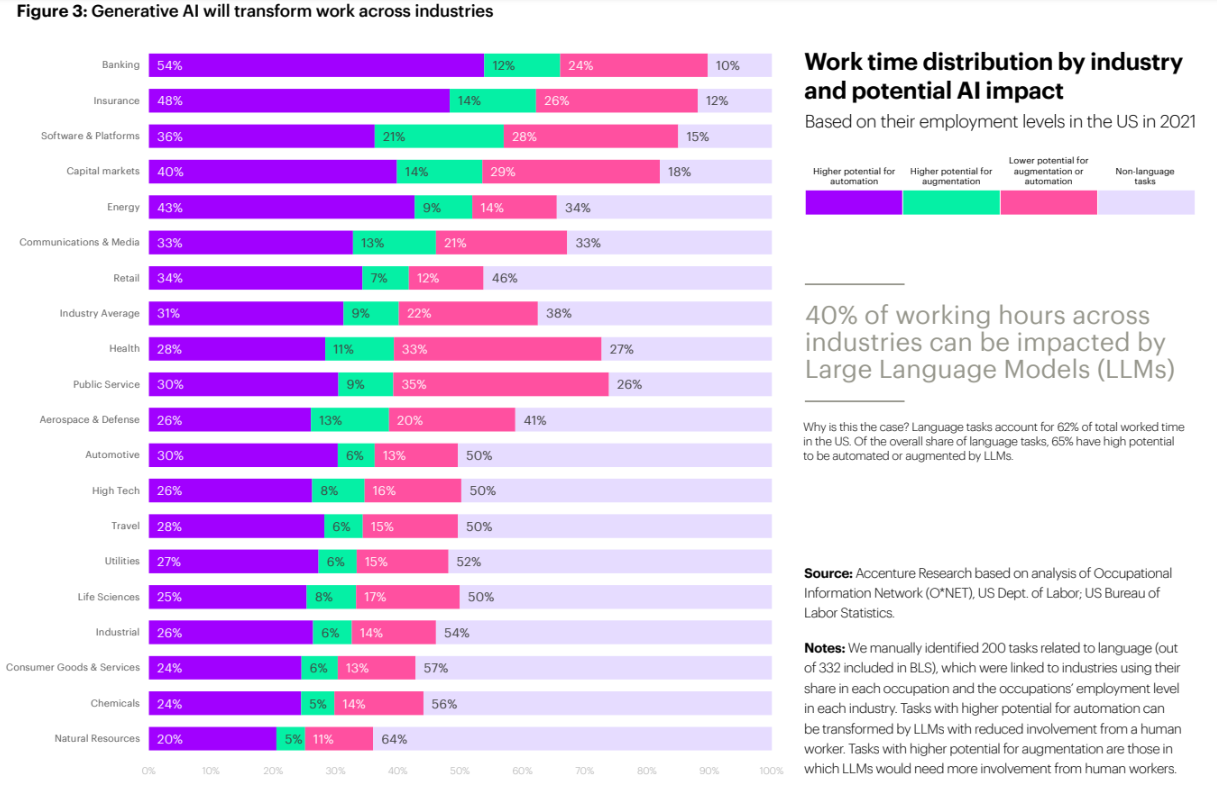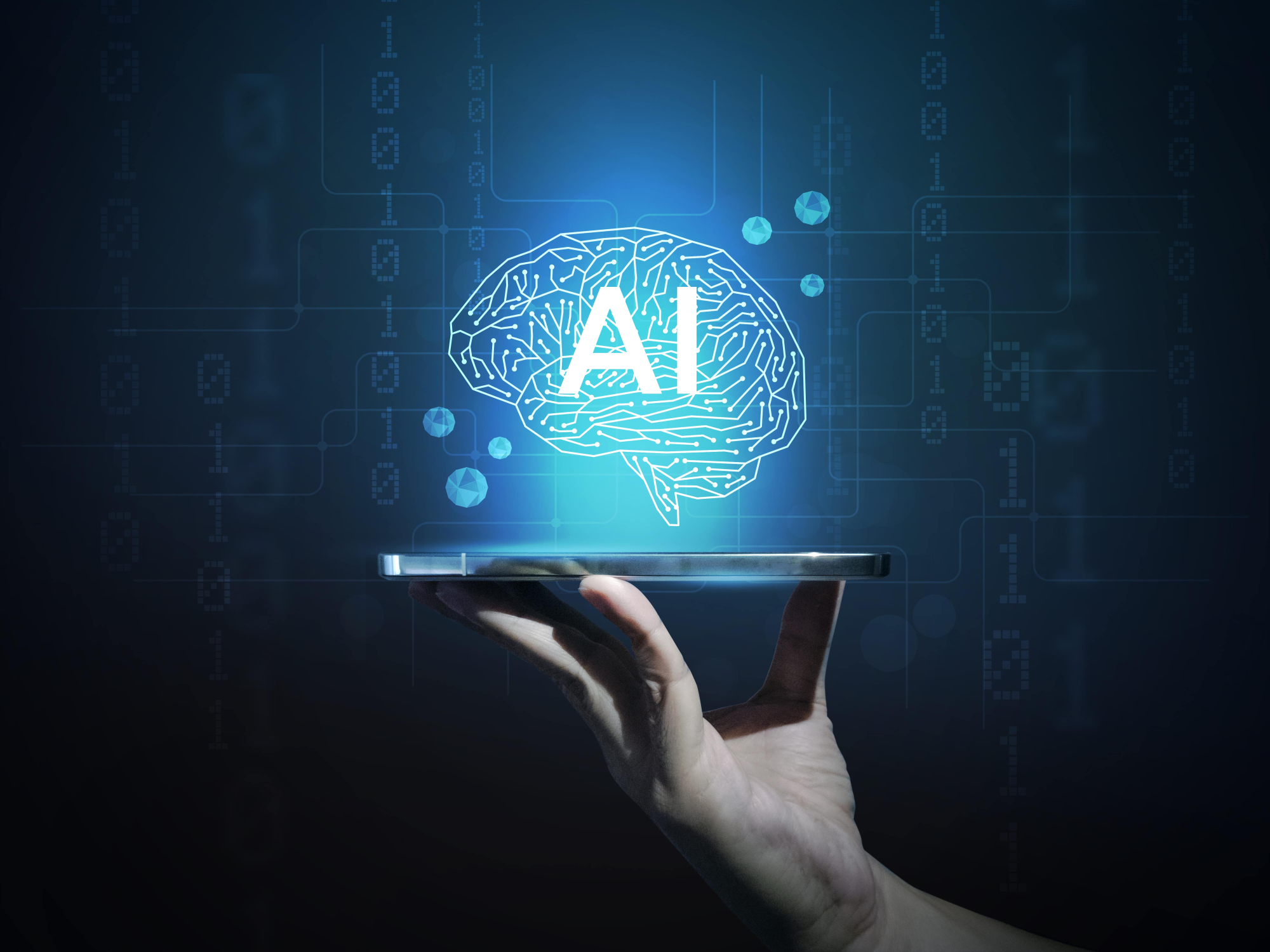Artificial Intelligence (AI) has rapidly advanced in recent years, and its influence on various industries is undeniable. From revolutionising business operations to transforming job roles, AI is set to impact the workforce significantly.
Let’s explore the implications of AI on jobs, the economy, and specific industries such as accounting and marketing – with a focus on how businesses can adapt and thrive in this new era.
The Broader AI Business Impact
The capabilities of AI extend beyond automating routine tasks; AI can analyse large data sets, predict trends, and make decisions faster and more accurately than human workers.
This level of efficiency and precision brings substantial benefits to businesses, including reduced costs, increased productivity, and improved decision-making processes.
Global Economic Impact of AI
The impact of AI on the economy is profound.
According to PwC, AI technologies are projected to contribute up to $15.7 trillion to the global economy by 2030. This growth is driven by productivity gains, product and service innovations, and the creation of new markets.
Emerging markets stand to gain the most from AI adoption, as they can leapfrog traditional development stages and directly implement advanced technologies.
This technological revolution is expected to generate significant economic gains, making AI a critical component for businesses aiming to excel in a competitive market.
Businesses that leverage AI effectively will likely see substantial economic benefits, while those that lag may struggle to compete.
AI and Automation: Impact on Jobs
One of the most significant concerns is the impact of AI on jobs, and the question on everyone’s mind is, ‘How many jobs will AI replace?’
While AI and automation can lead to job displacement, they also create new opportunities. According to The Future of Jobs Report 2023 by the World Economic Forum, AI is expected to change approximately 23% of jobs by 2027, with 69 million new jobs created and 83 million eliminated.
The job market will see a shift as AI could potentially replace low-skilled jobs, but it will also create demand for highly skilled positions in AI development, data science, and other tech-driven fields.
The key for businesses is to facilitate a smooth transition for their workforce by investing in upskilling and reskilling programmes. By doing so, they can ensure that the labour force is equipped to handle more complex and high-value tasks, thereby remaining relevant and competitive in the evolving job market.
Understanding AI’s impact on jobs is essential for policymakers and businesses as they navigate this transformative period.
AI Impact on Industries
AI’s impact on the job market varies across industries.
In some sectors, AI is enhancing human capabilities, while in others, it’s automating tasks entirely.
Here’s a closer look at how AI is affecting different job markets:
Manufacturing
AI and industrial robots are streamlining production processes, reducing errors, and improving quality control. While this leads to a reduction in manual labour, it also creates new roles in AI maintenance and oversight.
Healthcare
AI software is revolutionising diagnostics, treatment plans, and patient care. Medical professionals now rely on AI for accurate diagnoses, advanced imaging analysis, and personalised treatment plans.
AI systems can analyse high volumes of data quickly, identifying patterns that might be missed by the human eye and providing recommendations based on the latest medical research.
This integration of AI into healthcare not only improves diagnostic accuracy but also helps streamline administrative tasks, allowing healthcare providers to focus more on patient care and less on routine processes.
Finance
AI is transforming financial services through automated trading, fraud detection, and personalised financial advice. This allows financial professionals to focus more on higher-level tasks such as strategy and client relations.
Retail
AI-driven insights are enabling retailers to streamline their operations with advanced inventory management and improved supply chain logistics.
AI is also helping to improve the customer experience through personalised recommendations, targeted marketing and instant support, thanks to AI-powered chatbots and virtual assistants.
Accounting
AI’s impact on accounting is profound, automating routine tasks such as data entry, reconciliation and reporting to increase efficiency and accuracy.
It also improves financial analysis and forecasting by leveraging advanced algorithms to process large datasets and uncover trends.
AI-powered tools can also help identify potential fraud and compliance issues, ensuring greater security and regulatory adherence.
This affords accountants more time for strategic activities, such as financial planning and analysis.
Administrative Services
AI is transforming administrative services by automating repetitive tasks, such as scheduling, data entry and document control.
AI-powered virtual assistants can handle routine enquiries, manage calendars, and streamline communication, allowing administrative professionals to focus on more strategic and complex tasks. This helps to reduce the potential for human error while increasing productivity.
Marketing
Marketing is another area where AI is making significant strides.
AI algorithms can analyse customer data to create personalised marketing campaigns, predict consumer behaviour and optimise advertising spend.
This leads to more effective marketing strategies and improved ROI. Generative AI Tools such as chatbots and AI-driven content creation are also improving customer engagement and support.
 Image source: https://www.weforum.org/agenda/2023/05/jobs-lost-created-ai-gpt/
Image source: https://www.weforum.org/agenda/2023/05/jobs-lost-created-ai-gpt/
How Businesses Can Adapt and Embrace the AI Revolution
Embracing and adapting to the impact of AI on the workforce is essential for businesses looking to remain competitive and innovative.
Here are several pointers to help you effectively integrate AI into your operations:
1. Assess Your Current Capabilities
Before diving into AI, it’s important to understand your current technological capabilities and identify areas where AI can add value.
Conduct a thorough assessment of your existing systems, processes and data infrastructure. This will help you pinpoint specific pain points and opportunities where AI can be most effective.
2. Invest in AI Technology Training and Education
One of the biggest challenges businesses face when integrating AI is the skills gap.
To overcome this, invest in training and education for your employees. Offer courses, workshops, and certifications in AI, machine learning, and data science.
Encouraging continuous learning will help your workforce stay up to date with AI advancements and better equip them to leverage AI tools.
3. Start Small with Pilot Projects
Implementing AI across an entire organisation can be overwhelming, so start with small pilot projects to test the waters.
Choose a specific area or process where you believe AI may significantly impact your business and run a pilot to evaluate its effectiveness. This approach allows you to learn from initial experiences and refine your AI strategy before scaling up.
4. Partner with AI Experts
Collaborate with AI experts, consultants, and vendors to gain insights and support for your AI initiatives.
These partnerships can provide valuable expertise and resources, helping you navigate the complexities of AI implementation.
Working with established AI vendors can offer access to cutting-edge technologies and solutions tailored to your business needs.
5. Focus on Data Quality and Management
AI thrives on data. Ensuring you have high-quality, well-managed data is essential for successfully implementing AI programmes.
Invest in robust data management practices, including data cleaning, integration and governance. This will help you build a solid foundation for AI applications and ensure that the insights generated are accurate and reliable.

6. Foster a Culture of Innovation
Encouraging a culture of innovation within your organisation is key to embracing AI.
Promote open-mindedness and experimentation amongst your employees. Encourage them to explore new ideas and technologies without fear of failure. This mindset can promote creativity and drive the adoption of AI across various business functions.
7. Align AI with Business Goals
AI initiatives should be aligned with your overall business goals and strategy. Clearly define the objectives you aim to achieve with AI, whether it’s improving customer service, increasing operational efficiency, or driving revenue growth.
By aligning AI with your business objectives, you can help ensure that your AI investments deliver tangible and measurable results.
8. Address Ethical and Regulatory Considerations
The implementation of AI comes with certain ethical and regulatory challenges.
Ensure your AI initiatives adhere to relevant laws and regulations, such as data privacy and security standards. It’s also important to consider the ethical implications of AI, such as bias and transparency.
Developing a comprehensive AI governance framework can help you address these issues and build trust with stakeholders.
9. Communicate the Benefits of AI
To integrate AI into your organisation successfully, the advantages of AI should be clearly communicated to your employees, customers, and stakeholders.
Emphasise that by streamlining repetitive tasks, analysing large amounts of data, and assisting with decision-making, AI can help to boost productivity and elevate customer experiences.
This ultimately allows staff to focus more on the strategic and creative aspects of their roles – resulting in greater job satisfaction.
10. Monitor and Measure AI Performance
Once AI systems are in place, it’s important to continuously monitor and measure their performance. Establish KPIs to track the effectiveness of AI applications and their impact on business outcomes.
Regularly review these metrics to identify areas for improvement and make data-driven decisions to optimise your AI strategy.
Embracing AI for a Future-Ready Workforce
The impact of AI on the workforce is multifaceted. In essence, it encompasses job displacement, the creation of new roles, and overall economic growth.
Businesses should adapt to these changes where it makes sense to do so by investing in AI technologies and upskilling their workforce.
Get in touch with our friendly team for further information on how we can support your investment in AI through tailored business financing options.
Frequently Asked Questions
AI will automate routine tasks and create new jobs requiring advanced and different skills. Upskilling and reskilling will be essential for the workforce to adapt to these changes.
Industries such as manufacturing, healthcare, finance, retail, accounting, and marketing will significantly change due to AI integration.
While AI may displace some jobs, it will also create new opportunities. The net effect on employment depends on how businesses and workers adapt to these changes.
Businesses should invest in AI technologies, focus on upskilling their workforce, and develop strategies to leverage AI for improved efficiency and innovation.
AI can drive significant economic growth by boosting productivity, encouraging innovation, and creating new markets and job opportunities.





